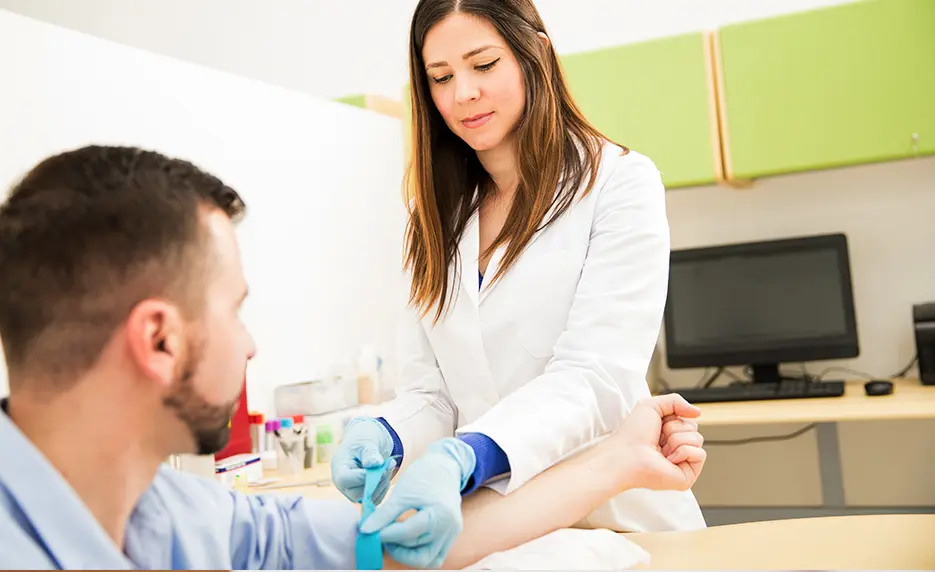PACE NONCREDIT COURSE:
Certified Phlebotomy Technician (Voucher + Lab Included)
Areas of Study
Course Type

Overview
Hours: 200 | Duration: 12 months
Become a Certified Phlebotomy Technician
Phlebotomy Technicians are essential to proper healthcare worldwide as they are responsible for drawing blood needed for tests, donations, transfusions, and research. As the population ages and diseases spread across the globe, the need for qualified phlebotomists will only increase. The asynchronous, online phlebotomy certification course includes simulation experience through the inclusion of a lab kit for assignments and aligned simulations for practice. You will have access to videos outlining procedures and “how to’s” that allow for firsthand practice as expected in real-world scenarios. This CPT certification course will also provide you with comprehensive, all-inclusive training, which will assist you in pursuing a new career as a phlebotomy technician and includes a complimentary voucher to sit for the Certified Phlebotomy Technician (CPT) certification exam through the National Healthcareer Association (NHA) upon eligibility.
The course also includes an opportunity to participate in an unpaid clinical experience.
Disclaimer: To qualify for the clinical experience application process, students must complete the online course successfully and have account balances up to date (at a minimum). Going through the clinical experience application process does not guarantee a placement. However, affiliated partnerships increase the likelihood of finding a site that matches student needs. COVID may be affecting the capacity of availability in your area. Students can begin researching the steps of the application process two weeks before completing courses.
Curriculum
-
- Medical Terminology
- The Musculoskeletal System
- The Cardiovascular System
- The Lymphatic and Immune Systems
- The Respiratory System
- The Digestive System
- The Urinary System
- The Nervous System
- The Special Senses: The Eyes and Ears
- The Integumentary System
- The Endocrine System
- The Reproductive System
- Diagnostic Procedures, Nuclear Medicine, Pharmacology
- Certified Phlebotomy Technician
- Introduction to Phlebotomy
- Anatomy for Phlebotomy Technicians
- Personal and Patient Safety
- Infection Control
- Quality Control
- Foundations and Preparation for Blood Collection
- Performing the Blood Collection
- Post-Collection Procedures
- Dermal Puncture and Capillary Collection
- Post-Collection Procedures for Dermal Puncture and Capillary Collection
- Special Collections
- Special Considerations
- Non-Blood Collections and Less Commonly Performed Procedures
- Lab Procedures, Processing, and Operations
- Legal and Ethical Matters
- Medical Terminology
Course Requirements
Requirements: Hardware Requirements: Software Requirements: Instructional Material Requirements: The instructional materials required for this course are included in enrollment. The following textbooks will be shipped to you approximately 7-10 business days after enrollment in the Medical Terminology course: The following textbooks will be shipped to you approximately 7-10 business days after enrollment in the Phlebotomy Course: Please Note: You will receive a digital book if the physical book is on backorder. The following materials will be shipped to you approximately 7-10 business days after enrollment in the Phlebotomy Course: Prerequisites: To participate in the competency activities and receive feedback from your instructor, you will need to have access to a video camera (on the phone or other device of familiarity) and be able to upload the video as an .mp4 file to the assignment pages for review. These activities are required in order to successfully pass the course. Certification Requirements: To sit for the NHA CPT certification exam, candidates must have a high school diploma or equivalent. It is recommended you have this before enrolling in this program. In addition, for NHA certification, you must successfully complete the required number of venipunctures and dermal punctures.
